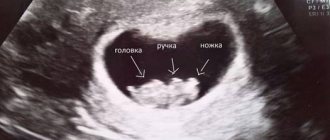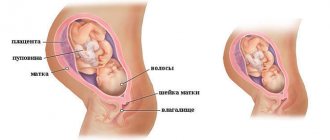Interesting Facts
| Options | Indications |
| Time from conception | 26 weeks |
| Period by month | 28 weeks |
| What month | 7 |
| Dimensions and weight of the fetus | 375 mm, 1000 g |
| Uterus dimensions | At the middle of the distance between the navel and the xiphoid process, VDM - 26-28 cm |
| Pregnant weight | Gain from the beginning of pregnancy is 8-12 kg; over the last week no more than 400-500 g |
Your baby is the size of
Head lettuce
375 mm Size
1000 g Weight
Your pregnancy lasts 28 weeks. The development of the fetus and the mother’s feelings during this period are inextricably linked. You can clearly feel the baby's movements. With movements, he can respond to stroking the abdomen, sharp sounds or emotional tension of a woman. The child will recognize your voice and even, according to some studies, remember the lullabies that you sing now. If he is uncomfortable with the position you have taken, he will definitely let you know about it with strong thrusts.
Let's find out what changes occur in the development of the fetus and what symptoms you should be especially careful about. But first, a little math:
- 28th week of pregnancy - what month?
You are 7 months pregnant, most of the journey is already behind you.
- What trimester?
The final (third) trimester of pregnancy is underway.
Feelings of the expectant mother
By the 28th week of pregnancy, the uterus has already increased 4 times. Due to its pressure on surrounding organs, you experience frequent urination and digestive problems. Due to the shift in the center of gravity, you have to bend your lower back somewhat, so by the evening it may ache. Wearing a bandage, gymnastics on a fitball, and massage will help you cope with this.
Alarming symptoms
- Be aware of vaginal discharge during the 28th week of pregnancy. Normally, they should be whitish, homogeneous with a sour odor. If streaks of blood or pus appear, consult a doctor immediately: it may be an infection or inflammation of the genital tract.
- Due to the high activity of your child, your stomach may hurt. As a rule, the sensation disappears as soon as the baby takes a comfortable position. However, if you feel sick at the same time, your stomach feels like it’s turning to stone, you need to consult a specialist.
Pregnancy calendar 28 week
A baby born at 28 weeks of gestation is premature, but with appropriate medical care has every chance of survival. Despite the fact that surfactant (a substance that ensures effective breathing for a newborn) is not yet sufficient, the use of special equipment makes it possible to saturate the baby’s blood with oxygen. The baby’s independent breathing has not yet fully developed, but he can already breathe a little (albeit with difficulty), and at birth he makes faint sounds that are more reminiscent of a squeak than a cry. Also, a person born at this time will need some hormonal correction and the creation of certain temperature conditions, because the fetus has not yet developed its own thermoregulation. Since the sucking reflex in a baby born at 28 weeks of gestation is poorly formed, he is fed through a tube.
At 28 weeks of pregnancy, the baby's weight is about 1100 grams and its length is 35-36 centimeters. At this stage, there is a rapid increase in body weight, this leads to the fact that the fetus in the uterus becomes crowded and it cannot be as active as before. The baby has already taken a certain position in the uterus (breech presentation is typical for the 28th week of pregnancy), but until the end of pregnancy the fetus will change position more than once. The child already has some fat deposits in the subcutaneous tissue, but his appearance still resembles that of a little old man due to the wrinkled skin covered with a cheese-like lubricant. The length of the hair on the baby’s head has already reached 0.5 centimeters, and the nail plates on the legs and arms do not reach the fingertips. The child’s ears are soft due to the fact that the formation of cartilage tissue has not yet occurred, and the ears themselves fit tightly to the head. In male children there was no descent of the testicles into the scrotum; in girls, the clitoris protruded beyond the boundaries of the labia majora.
The baby's senses are quite well developed. Feeling the mother's soothing strokes on the stomach, the baby becomes quiet. He listens to his parents and distinguishes their voices from those of strangers. The retina of the child's eye is already able to distinguish sunlight penetrating through the wall of the abdomen.
At the 28th week of pregnancy, the placenta develops intensively, and the volume of amniotic fluid increases. As a result, the uterus grows, which leads to compression of the blood vessels and venous stagnation in the lower part of the body. If a woman had a predisposition to varicose veins before pregnancy, then it is imperative to take care of her legs. Special orthopedic underwear, compression tights or stockings will prevent the development of spider veins on the legs and thighs and relieve heaviness in the legs. The woman seems clumsy and slow to herself, but her health remains satisfactory. She had already gotten used to slight shortness of breath, increased fatigue and swelling of the extremities in the evening. She also learned to cope with heartburn, constipation, slight dizziness and other minor troubles. A woman knows that the slightest deviation from the usual state should not go unnoticed. High blood pressure, increasing headache, severe swelling, pain in the lower abdomen, vomiting, frequent contractions of the uterine muscles, and prolonged inactivity of the baby should be the reason for urgent medical attention.
Risks of the 28th week of pregnancy include spotting or bleeding from the vagina. This is a symptom of a low placenta. A woman who has developed bleeding should remain in the hospital under medical supervision until delivery.
During this period of pregnancy, a woman should count fetal movements in the morning and evening (Pearson test). Normally, a child makes at least 10 movements per hour. The absence of tremors or their insignificant amount requires immediate examination by a doctor.
At 28 weeks, maternity leave begins for multiple pregnancies. Now all a woman’s worries come down to preparing for childbirth and the first days of the child’s life. Specialized courses for expectant mothers will help a woman better cope with late pregnancy and the birth process. While it is not yet so difficult to move, you should take care of the baby’s “dowry”, which will be required for discharge from the maternity hospital.
What's happening to the baby
The baby's weight at 28 weeks of pregnancy averages 1 kg with a height of 37.5 cm. It occupies almost the entire uterine cavity, so you are acutely aware of its movements. His arms and legs are bent and brought to his body - he lies curled up. If the head is adjacent to the opening of the uterus, this is a cephalic presentation. It is ideal for natural childbirth. There is no need to worry if the fetus has not occupied it at 28 weeks: it has time until the 36th week of pregnancy.
Other achievements of week 28:
- the subcutaneous fat layer is intensively formed;
- muscle and bone tissue is formed, which is why the baby needs a lot of calcium;
- the child can already focus on one point with his gaze, reacts to light and sounds, distinguishes the taste and smell of amniotic fluid;
- the respiratory system can function in air;
- the skin becomes lighter, redness disappears.
Tests and ultrasound
If at 28 weeks of pregnancy you have a scheduled visit to the gynecologist, prepare for it a few days in advance: take a urine test, write down all the questions that concern you. At the appointment, the specialist will measure your abdominal circumference and blood pressure. You will also have to weigh yourself and, if indicated, take a blood glucose test and a smear for vaginal microflora.
An ultrasound at 28 weeks of pregnancy is performed only if the doctor needs help in making a diagnosis for alarming symptoms in a woman. The ultrasound specialist will assess the compliance of the size of the fetus with established standards, examine the condition of the placenta, umbilical cord and the volume of amniotic fluid. You can find out with almost 100 percent probability whether it is a boy or a girl: the genitals are fully formed, and the baby will no longer be able to “hide.”
Fetal ultrasound
At week 28, an ultrasound examination is performed if the pregnant woman has complaints about her health and the gynecologist needs help in making a diagnosis. During an unscheduled ultrasound, the diagnostician evaluates the main indicators of fetal development: whether its size corresponds to age standards, the degree of maturity of the placenta, the condition of the umbilical cord and amniotic fluid.
For parents expecting girls and expecting boys, the ultrasound method allows them to dispel doubts about the gender of the baby. Given that the baby's genitals are fully formed, the doctor can tell the mother and father who lives in the tummy. In addition, it determines what position the fetus occupies in the uterus. If he still has not taken the position that is convenient for childbirth - head down, then there is nothing wrong with that: the baby still has time to turn over by the time he is born.
What to discuss with your doctor
- If your Rh factor is negative, then the 28th week of pregnancy is the ideal time to inject anti-D antibodies, the purpose of which is to prevent a possible Rh conflict. Remind your gynecologist about this.
- If you are bothered by swelling even in the morning, if not only your limbs, but also your face are swollen, be sure to inform your doctor about this. Swelling, along with high blood pressure and protein in the urine, is a possible sign of gestosis during pregnancy.
- When constipation is not helped by diet and drinking plenty of fluids, discuss with your doctor what medications you can use to improve intestinal motility.
Possible complications
One of the most severe pathologies of the 28th week of pregnancy is premature birth. They occur against the background of infections, genetic pathologies in fetal development, and with isthmic-cervical insufficiency. Unfavorable factors are emotional stress and excessive physical activity.
But the chances of a baby surviving at 28 weeks of pregnancy are quite high, because all organs and systems are practically formed. Proper care for it and timely seeking medical help in most cases guarantee a favorable outcome.
Ultrasound at 28 weeks of pregnancy
During the entire pregnancy, a woman undergoes three scheduled ultrasound examinations. The first two should have already been carried out, and she will have a third ultrasound at 30-34 weeks. At 28 weeks of pregnancy, during a normal pregnancy, there is no need for this study. However, there are situations when you cannot do without it. It happens that a pregnant woman has complaints that may indicate some kind of threat to the life of her baby or to her own. These include the appearance of bloody discharge, severe pain in the lower abdomen, absence or increased fetal activity. During an ultrasound, the doctor will assess the vital activity of the fetus, and also determine its position and all the necessary dimensions. In addition, it is necessary to determine the amount of water, the degree of maturity of the placenta and its position, and in some cases, the presence or absence of signs of placental abruption (if bloody discharge appears). An important indicator will be the length of the cervix.
Lifestyle: our tips
We recommend that you control your weight. The permissible gain at 28 weeks of pregnancy is 8-9 kg. Extra pounds are one of the negative factors in the development of diabetes during pregnancy and complications during childbirth. Control your diet, do not eat at night, avoid sweets and starchy foods. If you are inexorably drawn to sweets, replace them with fruits, nuts, and dried fruits. Consult your pregnancy doctor about the need to take magnesium supplements: often manic cravings for sweets are associated precisely with a deficiency of this element.
When choosing different types of physical activity, pay attention to fitball exercises for pregnant women. Exercises with this simple exercise will help you get rid of tension in the lower back and strengthen the muscles of your legs and back. Exercising with a fitball is fun and easy. In addition, it will be useful to you after the birth of the baby: many mothers comfortably rock the baby while sitting on a gymnastic ball.
Checklist for 28 weeks of pregnancy
- Plan your routes so that you always have the opportunity to visit the restroom. Now you want to go to the toilet more and more often, but if you endure it, you risk “earning” cystitis.
- Do not sleep or rest lying on your back. In this position, the uterus compresses the inferior vena cava, which disrupts the blood supply to the uterus and causes hypoxia.
- To get rid of fears and prepare yourself for the upcoming birth, attend specialized courses for pregnant women.
- Give preference to spending time in a quiet home environment: loud, sharp sounds negatively affect the baby’s well-being.
We invite you to the School of Motherhood at the Women's Medical Center. Here you will learn how childbirth goes and how to help yourself and your baby during this period, how to care for your newborn and yourself after childbirth. Connecting with like-minded people will also help you normalize your emotional state and cope with anxiety and uncertainty.
What happens to the mother's body at 28 weeks of pregnancy
In the third trimester, you and your baby still have some growing to do. But you may already notice that you are getting tired faster, especially when you walk. Your body does a hard job maintaining the right conditions for your baby to develop and grow during the last trimester. Continue to watch your diet: eat healthy and nutritious foods every day. Eating a balanced diet during pregnancy will, among other things, have a positive effect on your energy levels. Your doctor may recommend taking prenatal vitamins or supplements to ensure you get enough calcium and iron. Moderate physical activity will help you feel more alert and is generally beneficial for you and your baby. If you are concerned about the weight you have gained, ask your doctor how he assesses the gain.










